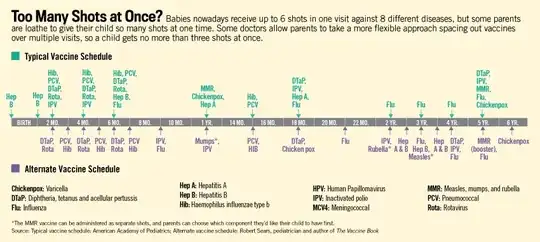Skeptics.SE has previously addressed the question of whether it is dangerous to follow the recommended vaccine schedule, in which multiple vaccines are administered at the same time: Is it dangerous to have several vaccines at the same time? (spoiler: answers say no, there is no danger). I want to know whether there is any increased danger associated with not following the recommended vaccine schedule, and following an alternative schedule instead.
Various people have advocated for vaccine schedules like the following (via usnews.com), which delay some vaccines in order to spread them out:
Some have claimed that there is no danger in spreading out vaccines. For example, Donald Trump has tweeted that "we have nothing to lose":
Lots of autism and vaccine response. Stop these massive doses immediately. Go back to single, spread out shots! What do we have to lose.
(emphasis mine) and on another occasion:
With autism being way up, what do we have to lose by having doctors give small dose vaccines vs. big pump doses into those tiny bodies?
However, experts have suggested some plausible risks associated with alternative vaccine schedules, for example:
- that babies who get vaccines later than prescribed by the official schedule might contract the diseases that the vaccines protect against at higher rates than babies who follow the official schedule
- that more doctors' visits due to spreading out vaccines across multiple visit can increase the number of viruses and other illnesses that babies catch in the doctor's office
- that some vaccines may have a higher risk of side effects when administered at a later age than the recommendation
but it's not clear to me whether any of these (or any other potential risks associated with alternative schedules) have been empirically evaluated.
Is there any research showing that we have "nothing to lose" by spreading vaccines out over a longer period of time? Or, is there any reliable empirical evidence showing otherwise?
